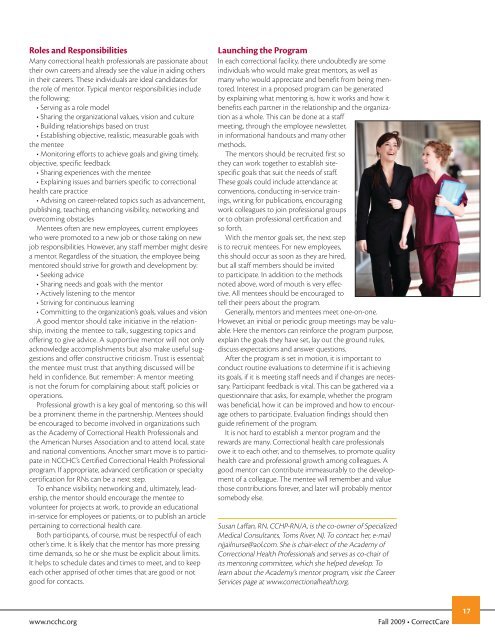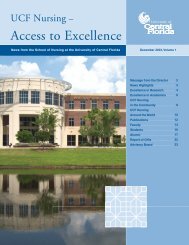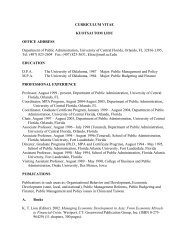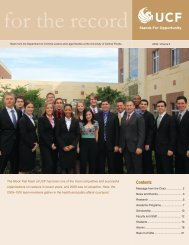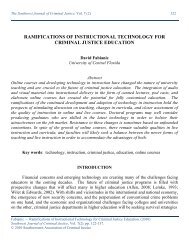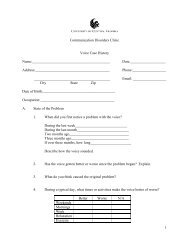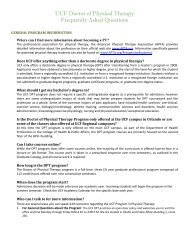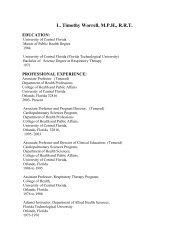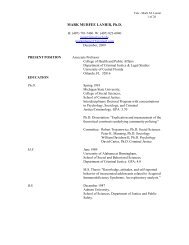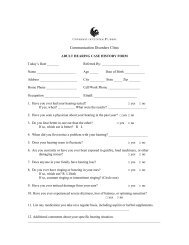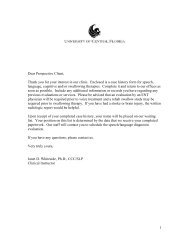Fall - National Commission on Correctional Health Care
Fall - National Commission on Correctional Health Care
Fall - National Commission on Correctional Health Care
You also want an ePaper? Increase the reach of your titles
YUMPU automatically turns print PDFs into web optimized ePapers that Google loves.
(c<strong>on</strong>tinued)Roles and Resp<strong>on</strong>sibilitiesMany correcti<strong>on</strong>al health professi<strong>on</strong>als are passi<strong>on</strong>ate abouttheir own careers and already see the value in aiding othersin their careers. These individuals are ideal candidates forthe role of mentor. Typical mentor resp<strong>on</strong>sibilities includethe following:• Serving as a role model• Sharing the organizati<strong>on</strong>al values, visi<strong>on</strong> and culture• Building relati<strong>on</strong>ships based <strong>on</strong> trust• Establishing objective, realistic, measurable goals withthe mentee• M<strong>on</strong>itoring efforts to achieve goals and giving timely,objective, specific feedback• Sharing experiences with the mentee• Explaining issues and barriers specific to correcti<strong>on</strong>alhealth care practice• Advising <strong>on</strong> career-related topics such as advancement,publishing, teaching, enhancing visibility, networking andovercoming obstaclesMentees often are new employees, current employeeswho were promoted to a new job or those taking <strong>on</strong> newjob resp<strong>on</strong>sibilities. However, any staff member might desirea mentor. Regardless of the situati<strong>on</strong>, the employee beingmentored should strive for growth and development by:• Seeking advice• Sharing needs and goals with the mentor• Actively listening to the mentor• Striving for c<strong>on</strong>tinuous learning• Committing to the organizati<strong>on</strong>’s goals, values and visi<strong>on</strong>A good mentor should take initiative in the relati<strong>on</strong>ship,inviting the mentee to talk, suggesting topics andoffering to give advice. A supportive mentor will not <strong>on</strong>lyacknowledge accomplishments but also make useful suggesti<strong>on</strong>sand offer c<strong>on</strong>structive criticism. Trust is essential;the mentee must trust that anything discussed will beheld in c<strong>on</strong>fidence. But remember: A mentor meetingis not the forum for complaining about staff, policies oroperati<strong>on</strong>s.Professi<strong>on</strong>al growth is a key goal of mentoring, so this willbe a prominent theme in the partnership. Mentees shouldbe encouraged to become involved in organizati<strong>on</strong>s suchas the Academy of Correcti<strong>on</strong>al <strong>Health</strong> Professi<strong>on</strong>als andthe American Nurses Associati<strong>on</strong> and to attend local, stateand nati<strong>on</strong>al c<strong>on</strong>venti<strong>on</strong>s. Another smart move is to participatein NCCHC’s Certified Correcti<strong>on</strong>al <strong>Health</strong> Professi<strong>on</strong>alprogram. If appropriate, advanced certificati<strong>on</strong> or specialtycertificati<strong>on</strong> for RNs can be a next step.To enhance visibility, networking and, ultimately, leadership,the mentor should encourage the mentee tovolunteer for projects at work, to provide an educati<strong>on</strong>alin-service for employees or patients, or to publish an articlepertaining to correcti<strong>on</strong>al health care.Both participants, of course, must be respectful of eachother’s time. It is likely that the mentor has more pressingtime demands, so he or she must be explicit about limits.It helps to schedule dates and times to meet, and to keepeach other apprised of other times that are good or notgood for c<strong>on</strong>tacts.Launching the ProgramIn each correcti<strong>on</strong>al facility, there undoubtedly are someindividuals who would make great mentors, as well asmany who would appreciate and benefit from being mentored.Interest in a proposed program can be generatedby explaining what mentoring is, how it works and how itbenefits each partner in the relati<strong>on</strong>ship and the organizati<strong>on</strong>as a whole. This can be d<strong>on</strong>e at a staffmeeting, through the employee newsletter,in informati<strong>on</strong>al handouts and many othermethods.The mentors should be recruited first sothey can work together to establish sitespecificgoals that suit the needs of staff.These goals could include attendance atc<strong>on</strong>venti<strong>on</strong>s, c<strong>on</strong>ducting in-service trainings,writing for publicati<strong>on</strong>s, encouragingwork colleagues to join professi<strong>on</strong>al groupsor to obtain professi<strong>on</strong>al certificati<strong>on</strong> andso forth.With the mentor goals set, the next stepis to recruit mentees. For new employees,this should occur as so<strong>on</strong> as they are hired,but all staff members should be invitedto participate. In additi<strong>on</strong> to the methodsnoted above, word of mouth is very effective.All mentees should be encouraged totell their peers about the program.Generally, mentors and mentees meet <strong>on</strong>e-<strong>on</strong>-<strong>on</strong>e.However, an initial or periodic group meetings may be valuable.Here the mentors can reinforce the program purpose,explain the goals they have set, lay out the ground rules,discuss expectati<strong>on</strong>s and answer questi<strong>on</strong>s.After the program is set in moti<strong>on</strong>, it is important toc<strong>on</strong>duct routine evaluati<strong>on</strong>s to determine if it is achievingits goals, if it is meeting staff needs and if changes are necessary.Participant feedback is vital. This can be gathered via aquesti<strong>on</strong>naire that asks, for example, whether the programwas beneficial, how it can be improved and how to encourageothers to participate. Evaluati<strong>on</strong> findings should thenguide refinement of the program.It is not hard to establish a mentor program and therewards are many. Correcti<strong>on</strong>al health care professi<strong>on</strong>alsowe it to each other, and to themselves, to promote qualityhealth care and professi<strong>on</strong>al growth am<strong>on</strong>g colleagues. Agood mentor can c<strong>on</strong>tribute immeasurably to the developmentof a colleague. The mentee will remember and valuethose c<strong>on</strong>tributi<strong>on</strong>s forever, and later will probably mentorsomebody else.Susan Laffan, RN, CCHP-RN/A, is the co-owner of SpecializedMedical C<strong>on</strong>sultants, Toms River, NJ. To c<strong>on</strong>tact her, e-mailnjjailnurse@aol.com. She is chair-elect of the Academy ofCorrecti<strong>on</strong>al <strong>Health</strong> Professi<strong>on</strong>als and serves as co-chair ofits mentoring committee, which she helped develop. Tolearn about the Academy’s mentor program, visit the <strong>Care</strong>erServices page at www.correcti<strong>on</strong>alhealth.org.www.ncchc.org<str<strong>on</strong>g>Fall</str<strong>on</strong>g> 2009 • Correct<strong>Care</strong>17


